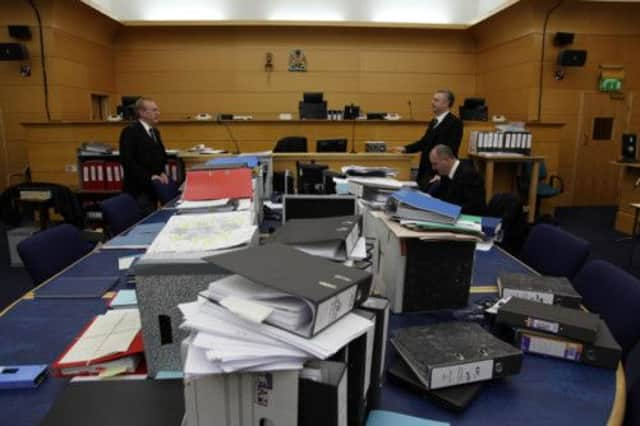Good legal aid system essential to justice


Concealed in these arguments is a client, who has been accused of a crime and faces the full resources of the state being brought to bear against him.
Imagine being accused of a crime, especially one you did not commit, and not being able to pay for a solicitor. Imagine being arrested, charged and detained and then being prosecuted by the Crown. Imagine the procurator fiscal addressing a jury: “Ladies and gentlemen of the jury, the Crown invites you to say that this person is guilty.”
Advertisement
Hide AdAdvertisement
Hide AdIt is difficult to picture the emotional gravity of these sorts of situations. However, in the context of criminal legal aid, the key question is whether a lack of finance should ever preclude someone in these circumstances from getting help in the form of legal representation.
There is a public interest in ensuring that the criminal justice system is effective and this means that everyone should be able to use it. The right to a fair trial is a fundamental right in a democratic society.
Ensuring that people receive an adequate defence is a crucial safeguard. Representation allows for evidence to be tested beyond reasonable doubt, it facilitates early resolution of cases, and it ensures procedural fairness throughout the process.
An adequately-funded defence prevents miscarriages of justice. We know this from the United States, where defence funding varies from state to state, but generally far more poorly than in Scotland. One study estimated over 10,000 wrongful felony convictions happen each year; that’s roughly equivalent to the population of a town the size of Cupar.
The Scottish Government is seeking to reduce significantly the existing expenditure on criminal legal aid. However, disproportionate differences in funding levels between prosecution and criminal defence should be a concern. A modern society requires a degree of equality of arms in an adversarial justice system.
In England and Wales, there is a contractual relationship between law firms who undertake criminal legal aid work and the legal aid authority.
Since 2001, the contracting model has restricted the practice of this work to those firms that hold a contract. The cost of administering legal aid increased significantly after the introduction of this exclusive system.
Recent proposals from the Ministry of Justice to further reform the contractual arrangements received a negative response from the criminal bar and other justice stakeholders, particularly around the potential effects on quality of service and the right to a solicitor of choice.
Advertisement
Hide AdAdvertisement
Hide AdIn Scotland, there is no contracting system for criminal legal aid. Law firms that wish to carry out the work can do so provided they are registered with the Scottish Legal Aid Board, the legal aid authority for Scotland.
However, the board is currently developing proposals around the possible introduction of a contracting system and is expected to submit options to the Scottish Government in September.
Changing the model of delivery for these services is potentially the biggest change to Scotland’s criminal legal aid system in decades but the details and rationale of such a change remain unclear.
Unless a contracting model is price-based it will not, in itself, generate savings to the taxpayer. Existing quality assurance measures show that quality of service is high so improvement in this area is probably not the main driver for reform either. The rationale for such a fundamental change to the system needs to be properly explained.
The enabling provisions to allow for such a shift were introduced by the Conservative government in 1997, before the Scottish Parliament was in existence. As such, MSPs have had no opportunity to debate this issue and will not be able to do so unless the justice committee agrees a motion to annul.
The existing legal aid system has not only worked well, providing high-quality legal representation for those who need it, free of charge, at low cost, it is also the historic achievement of thousands of people – those who fought to establish it, those who have spent their lives working for it, and everyone who has paid their taxes to build it up over more than 60 years since it was created. The founding principles of the Legal Aid and Solicitors Scotland Act 1949 to make “legal aid and advice… more readily available for persons of small or moderate means” have become core values of the Scottish justice system.
Replacing the existing model of delivering criminal legal aid without a clear rationale being established and without a full parliamentary debate on the change could be considered premature.
Whatever your circumstances today, one day you may find yourself in a position where you rely on a good legal aid system. It is up to all of us to ensure that one continues to exist.
• Matthew Thomson is criminal legal aid co-ordinator at the Law Society of Scotland www.lawscot.org.uk